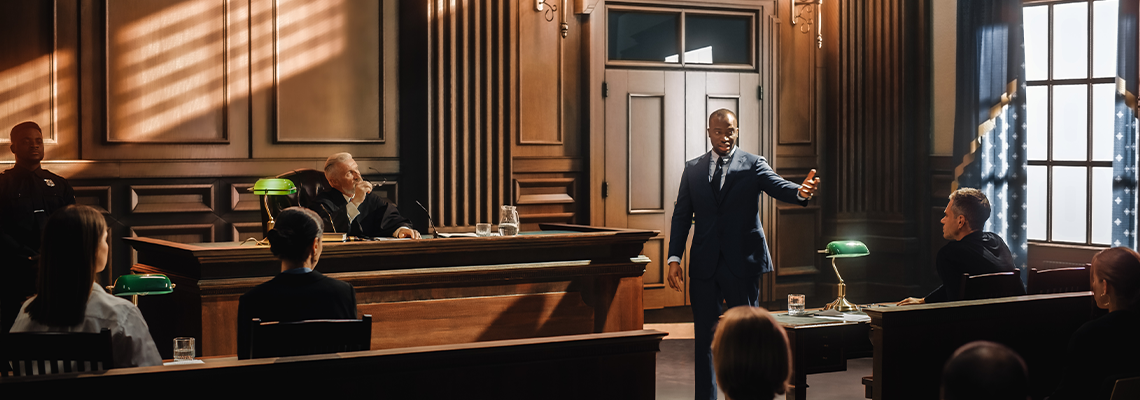If You Find Yourself Being Arrested or Questioned by The Police, Use These Helpful Tips:
“He who speaks without a lawyer present becomes, at his best, a fool — and at his worst, a felon.”
There are certain times in one’s life that become pivotal. A time when crucial decisions must be made on the spot, without warning. If you are ever questioned by the police, stand accused of a crime, are detained, or arrested that is undoubtedly one of those important times. What you choose to do—and to say, or not to say—may significantly alter not only what happens to you in that moment, but could alter the course of your life forever.
If approached by law enforcement, here are some top legal tips to keep in mind.
Be Polite.
If a police officer or detective approaches you — to either speak with you or to potentially arrest you — do not do anything that will draw negative attention to yourself. Be respectful. Do not argue with the officer, belittle him or her, call names, physically resist, or do anything else that could reflect poorly upon you as a person in that situation.
Be polite, but cautious. Nothing can be gained from interacting in a negative manner with an officer. Even if provoked, do not react by arguing, fighting, resisting, or attempting to flee. Being confrontational or difficult in this situation is like throwing gasoline on a fire that you are trying to extinguish. Don’t do it. If you try to run or get physically confrontational with an officer, you could get arrested and charged criminally for that behavior even if you had done nothing wrong before and even if the officer was wrong to stop you or interview you.
Record Your Interaction.
It is a sad but true issue that in the eyes of most courts and juries, a police officer has more credibility than you as to what was said and done during an interaction. Deserved or not, a police officer’s word or account is given more legitimacy by a lot of people than a suspect or witness. Therefore, if a situation or interaction is being described at a later date by you and by an officer, the officer’s version is more likely to be believed.
It is imperative that you record any interaction you have with the police so an unbiased and neutral version of events can be provided at a later date should it be necessary. Failing to record an interaction leaves you vulnerable to a subjective opinion about what happened and having to put your credibility against the credibility of a police officer — and you will likely lose that comparison most of the time, to most people. So, if you’re being arrested, make sure you or someone you’re with can record it as best as possible.
Do Not Make Any Statements.
If you are being questioned, detained, or arrested by the police, any information you provide to them can—and likely will—be used against you. It is the police officer’s or detective’s job to pursue the guilty, interrogate people, charge guilty people with crimes, and work to build criminal cases against them. Anything you say in this situation gives the officer information that could potentially harm you, infer your guilt, or help them to build a case against you.
When it comes to providing information, less is more. Identify yourself and provide your contact information (if asked to do so), but do not answer any additional questions, or make any statements, even if you think it may help you. It won’t. You can always give helpful information later after you consult with a lawyer who has your best interests in mind. Your lawyer will be on your side. The police officer is not.
Do Not Admit Guilt, or Confess to Anything — Either Verbally, or In Writing.
Doing so will not benefit you. It could lead to you being associated with or arrested for a crime, potentially being convicted of it, and facing serious jail time and a lifelong criminal record. What you say (and choose NOT to say) matters. There is absolutely no benefit to admitting anything to the police officer that you may have done or explaining your side of the story.
The officer/detective may indicate that he or she is trying to “help you.” But, in reality, what he/she is trying to do is arrest a guilty party (you) and convict someone (you) for committing a crime. Whether you did something wrong, or not, do not admit guilt, provide any information or details, or confess to anything either verbally, or in writing.
You can always cooperate later or provide additional information once you have consulted with an experienced criminal law attorney and understand your rights. You need legal advice on how to best handle your specific situation – what to say, what not to say, and what to do.
Do Not Consent to Any Searches.
There is a prevailing theory that it benefits you to consent to searches if the police ask. It simply isn’t true. This can lead to you being arresetd if you’re not careful. Until you speak with an attorney about your situation, you gain nothing by agreeing or consenting to a police search of your person, vehicle, home, or phone and stand to lose everything.
There is also a theory that if an officer asks for your consent to search, it is a test and they won’t actually search if you agree. Again, this is patently false. Anything you consent to an officer searching, they will gladly search. Your best option is to politely but directly state you do not consent to a search of anything and then talk to an attorney before you agree to any searches.
Ask if You Are Free to Leave.
Ask the officer if you are free to leave. If he/she indicates that you are free to leave, then do so immediately. Sticking around to talk to the officer or answering additional questions without the advice of a lawyer will likely lead you down a bad road, and it will almost never benefit you.
Ask if You Are Being Arrested — and Why.
If you are being arrested, you have a right to know the charges. The officer is supposed to read you Miranda Rights, if you are being placed under arrest. Ask the officer what crime(s) you are being charged with and try to remember what he/she tells you. You will want to tell your lawyer everything that he/she has questioned you about, accused you of, and any other information that you were told prior to your arrest. Remember as much as you can.
You Have the Right to Remain Silent.
And — you should. The Fifth Amendment of the U.S. Constitution provides you with certain rights. It states, in part:
No person shall be held to answer for a capital, or otherwise infamous crime, unless on a presentment or indictment of a Grand Jury . . . nor shall be compelled in any criminal case to be a witness against himself, nor be deprived of life, liberty, or property, without due process of law.
This amendment to the Constitution gives you the right to remain silent and it also provides you with the right to not incriminate yourself for a crime. Any information you give to the police may harm you. It is best to remain silent. You can simply say, “I want to consult an attorney before speaking with you or answering any questions. What is your number, so I can have my attorney call you?” No need to be rude. It is okay to be polite in tone, without saying much. Like a good mother’s advice, keep it “short and sweet.”
You Have the Right to An Attorney – Ask for One.
If the police suspect you of a crime, are questioning/interrogating you about a crime, allege that you committed a crime, or are arresting you, you have the right to an attorney — and you should definitely consult with one. Seek out an experienced criminal law attorney who has handled cases similar to yours.
Be sure to find an attorney who isn’t afraid to take your case to trial, if that should become necessary. This is a very important decision. Hire a reputable attorney. It could drastically alter the outcome, help you to potentially avoid jail time, and could change your life.
If You Cannot Afford an Attorney, Ask for A Public Defender to Be Appointed for You.
You are only eligible for a public defender if you have actually been charged with a crime. You must also qualify as an “indigent” defendant in order to potentially receive a public defender. If you qualify, you will pay very little for the representation, around $50-100. He/she will protect your interests and help you to navigate your situation. In the event that you do not qualify for a public defender, seek out a private criminal law attorney.
You have the right to a lawyer. You should definitely get one! It may be the most important decision you ever make with regard to your personal liberty.
Seek Legal Advice Specific to Your Situation.
Every situation and set of facts is different. No two situations are the exact same. Do not rely on what a family member, friend, neighbor, fellow church member, or anyone else who is NOT a lawyer tells you, even if he/she tells you that they faced a similar situation that was “just like yours.”
While these individuals may offer well-intended advice in an effort to “help” you, if it isn’t targeted advice from a lawyer about your specific situation, it could actually end up harming you. Like they always say, you get what you pay for. A friend’s free “legal” advice isn’t really “legal” advice at all. After all, you wouldn’t take your car to the bakery for an oil change. Asking a non-lawyer for legal advice is pretty much doing the same thing.
Hire an Experienced Attorney.
If you do not have a criminal law attorney ready to assist you, you can often consult with an experienced criminal law attorney for free. At The Nice Law Firm, LLP, we have experienced attorneys available to offer free criminal law consultations at (463) 307-0925. Call us to speak with one of our experienced attorneys about your specific situation and how we can work to achieve the best possible outcome for you.
You deserve an aggressive attorney to act as your advocate and work to protect your personal rights and interests. You need someone in your corner who will fight for you, who understands what your next steps are, and who will be with you every step of the way. Accept nothing less.
Remember, he who speaks without a lawyer present in this situation becomes “at his best, a fool, and at his worst, a felon.” The choice is yours.
Hire a competent, experienced criminal attorney to help you.
It could change everything.




